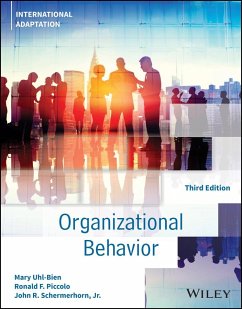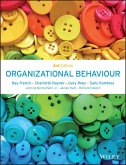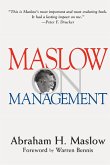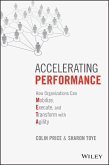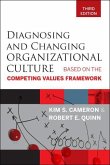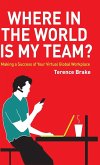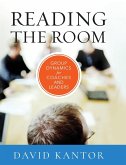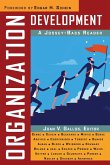Mary Uhl-Bien, Ronald F. Piccolo, John R. Schermerhorn
Organizational Behavior, International Adaptation
Mary Uhl-Bien, Ronald F. Piccolo, John R. Schermerhorn
Organizational Behavior, International Adaptation
- Broschiertes Buch
- Merkliste
- Auf die Merkliste
- Bewerten Bewerten
- Teilen
- Produkt teilen
- Produkterinnerung
- Produkterinnerung
Organizational Behavior is a multidimensional text that combines analysis, knowledge, personal development, and synthesis with useful pedagogical features that bring organizational behavior to life. Considering organizational behavior from an interdisciplinary vantage point, this book focuses on the interdependence of factors that explain human behavior. Frequently addressed organizational behavior subjects are considered from within an integrated framework and are employed to answer functionally relevant questions about why people behave the ways in which they do as well as how to effectively…mehr
Andere Kunden interessierten sich auch für
![Organizational Behaviour Organizational Behaviour]() Ray FrenchOrganizational Behaviour86,99 €
Ray FrenchOrganizational Behaviour86,99 €![Maslow on Management Maslow on Management]() Abraham H. MaslowMaslow on Management59,99 €
Abraham H. MaslowMaslow on Management59,99 €![Accelerating Performance Accelerating Performance]() Colin PriceAccelerating Performance26,99 €
Colin PriceAccelerating Performance26,99 €![Diagnosing and Changing Organizational Culture Diagnosing and Changing Organizational Culture]() Kim S. CameronDiagnosing and Changing Organizational Culture48,99 €
Kim S. CameronDiagnosing and Changing Organizational Culture48,99 €![Where in the World Is My Team? Where in the World Is My Team?]() Terence BrakeWhere in the World Is My Team?39,99 €
Terence BrakeWhere in the World Is My Team?39,99 €![Reading the Room Reading the Room]() David KantorReading the Room65,99 €
David KantorReading the Room65,99 €![Organization Development Organization Development]() Joan V. Gallos (ed.)Organization Development64,99 €
Joan V. Gallos (ed.)Organization Development64,99 €-
-
Organizational Behavior is a multidimensional text that combines analysis, knowledge, personal development, and synthesis with useful pedagogical features that bring organizational behavior to life. Considering organizational behavior from an interdisciplinary vantage point, this book focuses on the interdependence of factors that explain human behavior. Frequently addressed organizational behavior subjects are considered from within an integrated framework and are employed to answer functionally relevant questions about why people behave the ways in which they do as well as how to effectively influence and manage others.
Including several exciting updates to content, chapter features, and the OB Skills Workbook, this international edition leverages the foundational content, engaged writing style, and practical appeal of previous editions to address critical trends in the modern workplace. The new content focuses on ethics, identity and diversity, strategy, organizationalchange, theory of organizational justice, innovation, perception management in organizations, leadership, and the impact of the COVID-19 pandemic on modern worklife.
Including several exciting updates to content, chapter features, and the OB Skills Workbook, this international edition leverages the foundational content, engaged writing style, and practical appeal of previous editions to address critical trends in the modern workplace. The new content focuses on ethics, identity and diversity, strategy, organizationalchange, theory of organizational justice, innovation, perception management in organizations, leadership, and the impact of the COVID-19 pandemic on modern worklife.
Produktdetails
- Produktdetails
- Verlag: Wiley / Wiley & Sons
- Artikelnr. des Verlages: 1W119889650
- 3. Aufl.
- Seitenzahl: 384
- Erscheinungstermin: 20. November 2023
- Englisch
- Abmessung: 274mm x 218mm x 15mm
- Gewicht: 855g
- ISBN-13: 9781119889656
- ISBN-10: 1119889650
- Artikelnr.: 68801511
- Herstellerkennzeichnung
- Libri GmbH
- Europaallee 1
- 36244 Bad Hersfeld
- gpsr@libri.de
- Verlag: Wiley / Wiley & Sons
- Artikelnr. des Verlages: 1W119889650
- 3. Aufl.
- Seitenzahl: 384
- Erscheinungstermin: 20. November 2023
- Englisch
- Abmessung: 274mm x 218mm x 15mm
- Gewicht: 855g
- ISBN-13: 9781119889656
- ISBN-10: 1119889650
- Artikelnr.: 68801511
- Herstellerkennzeichnung
- Libri GmbH
- Europaallee 1
- 36244 Bad Hersfeld
- gpsr@libri.de
DR. MARY UHL-BIEN is the BNSF Railway Endowed Professor of Leadership in the Neeley School of Business at Texas Christian University (TCU). She holds an honorary doctorate at Copenhagen Business School in Denmark, and a PhD and MBA from the University of Cincinnati. Dr. Uhl-Bien is an active scholar and leader in the Academy of Management. She was ranked #6 in the Top 20 Most Influential Leadership Scholars since 1990 and has won multiple Best Paper awards, including two Decennial Awards, for her work on leadership. She is a founder of the Network of Leadership Scholars (NLS) in the Academy of Management and has served as both Representative-at-Large and Division Chair for the Organizational Behavior Division in the Academy, as well as on multiple Academy-wide leadership committees. She publishes her work in top journals including Academy of Management Journal, Journal of Applied Psychology, Journal of Management, and The Leadership Quarterly , and disseminates it both in the classroom and to practice through practitioner articles and executive education. She is passionate about undergraduate teaching and was recognized in Poets & Quants 2nd Annual Top 50 Undergraduate Business Professors. DR. RONALD F. PICCOLO is the Galloway Professor of Management in the College of Business at the University of Central Florida. From 2009-2016, he served as the Cornell Professor of Management and Academic Director of the Center for Leadership Development & Executive Education in the Crummer Graduate School of Business at Rollins College. Dr. Piccolo earned a PhD in management from the University of Florida, an MBA from Rollins, and a Bachelor of Science in mathematics from Stetson University. He has been a visiting scholar at Drexel University in Philadelphia, Tulane University, Jacobs University in Bremen, Germany, Kiel University, and the Amsterdam Business School. Dr. Piccolo teaches graduate-level courses in leadership, organizational behavior, research methods, and management strategy. His research on leadership, motivation, job design, and personality has been published in Forbes magazine, Monster.com, CIO.com, in numerous textbooks, and in top academic journals such as the Academy of Management Journal (AMJ), Journal of Applied Psychology, Personnel Psychology, Human Resource Management, Journal of Management, and the Journal of Organizational Behavior. In 2019, he was recognized by The Leadership Quarterly as one of the most highly cited leadership scholars since 1990. DR. JOHN R. SCHERMERHORN, JR. is the Charles G. O'Bleness Emeritus Professor of Management in the College of Business at Ohio University. He earned a PhD in organizational behavior from Northwestern University, an MBA (with distinction) in management and international business from New York University, and a BS in business administration from the State University of New York at Buffalo. Dr. Schermerhorn's international experience includes appointments as a visiting professor of management at the Chinese University of Hong Kong, the Kohei Miura Visiting Professor at Chubu University in Japan, Visiting Fulbright Scholar at the University of Botswana, member of the graduate faculty at Bangkok University in Thailand, and advisor to the Lao-American College in Vientiane, Laos. He was on-site coordinator for two years at the Ohio University MBA and Executive MBA programs in Malaysia. He currently teaches a graduate course in organizational behavior and strategic leadership at Universitá Politecnica delle Marche in Italy, and an organization behavior PhD seminar at the University of Pècs in Hungary. Dr. Schermerhorn is known to educators and students as senior author of Exploring Management 7e (Wiley, 2021) and Management 15e (Wiley, 2023). His research has been published in the Academy of Management Journal, Academy of Management Review, Academy of Management Executive, Organizational Dynamics, Asia-Pacific Journal of Management, and the Journal of Management Education, among other scholarly outlets. Ohio University named Dr. Schermerhorn a University Professor, the university's highest campus-wide honor for excellence in undergraduate teaching.
TABLE OF CONTENTS
Part 1: Why Do I Need to Study Organizational Behavior?
1 Introduction to Organizational Behavior
1.1 Organizational Behavior
What Is Organizational Behavior?
Why Is Organizational Behavior Important?
How Do We Learn about Organizational Behavior?
Disciplines That Contribute to Organizational Behavior
Abstractness in Organizational Behavior
1.2 Critical Thinking
What Is the Science of Organizational Behavior?
What Does It Mean to Think Critically?
Why Is It So Difficult to Think Critically?
What Are the Steps in the Critical Thinking Process?
1.3 Ethics in OB
What Are Ethics?
A Framework for Ethical Decision Making
Importance of Personal Ethical Fit
Self-Test Chapter 1
Self-Test Answers
Endnotes
2 Understanding Organizations
2.1 Organizational Strategy and Change
What Is Strategy?
Organizational Change and Adaptability
Consequences of Change: Stress and Burnout
2.2 Organizational Structure
What Is Organizational Structure?
Mechanistic vs. Organic Organizational Design
Team-Based Organizational Design
Innovative and Flexible Organizational Design
Why Do We Need Creativity and Innovation?
2.3 Organizational Culture
What Is Organizational Culture?
How Do We Identify an Organization's Culture?
How Can We Build More Effective Cultures?
Self-Test Chapter 2
Self-Test Answers
Endnotes
Part 2: Why Do People Behave as They Do?
3 Individual Differences
3.1 Personality
Nature or Nurture?
Are Personalities Stable?
What Are Behavioral and Social Traits?
What Are Self-Concept Traits?
"The Dark Side" of Personality
How Can We Assess Personality?
3.2 Emotions and Moods
What Are Emotions and Moods?
Coping with Stress: Job Demands-Resources Model
What Is Emotional Intelligence?
Cultural Aspects of Emotions and Moods
3.3 Attitudes and Behavior
What Is an Attitude?
What Are Job Attitudes?
How Do Attitudes Influence Work Behavior?
Negative Workplace Behaviors
Self-Test Chapter 3
Self-Test Answers
Endnotes
4 Perception and Bias
4.1 Perception and Cognitive Bias
What Is Perception?
What Is Attribution?
Cognitive Bias
Perception Management in Organizations
4.2 Identity and Social Bias
What Are Common Types of Self-Identities?
How Does Identity Affect Behavior?
Identity Threat
Social Bias
4.3 Perspective Taking and Diversity
Perspective Taking
Perspective Taking and Diversity
Benefits of Perspective Taking
Learning to Take Another's Perspective
Using Perspective Taking to Enhance Diversity and Inclusion
Self-Test Chapter 4
Self-Test Answers
Endnotes
5 Motivation
5.1 Motivation and Performance Management
What Is Motivation?
Pay for Performance
What Is Performance Management?
How Do We Create More Motivating Environments?
5.2 Needs Theories of Motivation
Maslow's Hierarchy of Needs
Alderfer's ERG Theory
Manifest Needs Theory
Self-Determination Theory (SDT)<
Part 1: Why Do I Need to Study Organizational Behavior?
1 Introduction to Organizational Behavior
1.1 Organizational Behavior
What Is Organizational Behavior?
Why Is Organizational Behavior Important?
How Do We Learn about Organizational Behavior?
Disciplines That Contribute to Organizational Behavior
Abstractness in Organizational Behavior
1.2 Critical Thinking
What Is the Science of Organizational Behavior?
What Does It Mean to Think Critically?
Why Is It So Difficult to Think Critically?
What Are the Steps in the Critical Thinking Process?
1.3 Ethics in OB
What Are Ethics?
A Framework for Ethical Decision Making
Importance of Personal Ethical Fit
Self-Test Chapter 1
Self-Test Answers
Endnotes
2 Understanding Organizations
2.1 Organizational Strategy and Change
What Is Strategy?
Organizational Change and Adaptability
Consequences of Change: Stress and Burnout
2.2 Organizational Structure
What Is Organizational Structure?
Mechanistic vs. Organic Organizational Design
Team-Based Organizational Design
Innovative and Flexible Organizational Design
Why Do We Need Creativity and Innovation?
2.3 Organizational Culture
What Is Organizational Culture?
How Do We Identify an Organization's Culture?
How Can We Build More Effective Cultures?
Self-Test Chapter 2
Self-Test Answers
Endnotes
Part 2: Why Do People Behave as They Do?
3 Individual Differences
3.1 Personality
Nature or Nurture?
Are Personalities Stable?
What Are Behavioral and Social Traits?
What Are Self-Concept Traits?
"The Dark Side" of Personality
How Can We Assess Personality?
3.2 Emotions and Moods
What Are Emotions and Moods?
Coping with Stress: Job Demands-Resources Model
What Is Emotional Intelligence?
Cultural Aspects of Emotions and Moods
3.3 Attitudes and Behavior
What Is an Attitude?
What Are Job Attitudes?
How Do Attitudes Influence Work Behavior?
Negative Workplace Behaviors
Self-Test Chapter 3
Self-Test Answers
Endnotes
4 Perception and Bias
4.1 Perception and Cognitive Bias
What Is Perception?
What Is Attribution?
Cognitive Bias
Perception Management in Organizations
4.2 Identity and Social Bias
What Are Common Types of Self-Identities?
How Does Identity Affect Behavior?
Identity Threat
Social Bias
4.3 Perspective Taking and Diversity
Perspective Taking
Perspective Taking and Diversity
Benefits of Perspective Taking
Learning to Take Another's Perspective
Using Perspective Taking to Enhance Diversity and Inclusion
Self-Test Chapter 4
Self-Test Answers
Endnotes
5 Motivation
5.1 Motivation and Performance Management
What Is Motivation?
Pay for Performance
What Is Performance Management?
How Do We Create More Motivating Environments?
5.2 Needs Theories of Motivation
Maslow's Hierarchy of Needs
Alderfer's ERG Theory
Manifest Needs Theory
Self-Determination Theory (SDT)<
TABLE OF CONTENTS
Part 1: Why Do I Need to Study Organizational Behavior?
1 Introduction to Organizational Behavior
1.1 Organizational Behavior
What Is Organizational Behavior?
Why Is Organizational Behavior Important?
How Do We Learn about Organizational Behavior?
Disciplines That Contribute to Organizational Behavior
Abstractness in Organizational Behavior
1.2 Critical Thinking
What Is the Science of Organizational Behavior?
What Does It Mean to Think Critically?
Why Is It So Difficult to Think Critically?
What Are the Steps in the Critical Thinking Process?
1.3 Ethics in OB
What Are Ethics?
A Framework for Ethical Decision Making
Importance of Personal Ethical Fit
Self-Test Chapter 1
Self-Test Answers
Endnotes
2 Understanding Organizations
2.1 Organizational Strategy and Change
What Is Strategy?
Organizational Change and Adaptability
Consequences of Change: Stress and Burnout
2.2 Organizational Structure
What Is Organizational Structure?
Mechanistic vs. Organic Organizational Design
Team-Based Organizational Design
Innovative and Flexible Organizational Design
Why Do We Need Creativity and Innovation?
2.3 Organizational Culture
What Is Organizational Culture?
How Do We Identify an Organization's Culture?
How Can We Build More Effective Cultures?
Self-Test Chapter 2
Self-Test Answers
Endnotes
Part 2: Why Do People Behave as They Do?
3 Individual Differences
3.1 Personality
Nature or Nurture?
Are Personalities Stable?
What Are Behavioral and Social Traits?
What Are Self-Concept Traits?
"The Dark Side" of Personality
How Can We Assess Personality?
3.2 Emotions and Moods
What Are Emotions and Moods?
Coping with Stress: Job Demands-Resources Model
What Is Emotional Intelligence?
Cultural Aspects of Emotions and Moods
3.3 Attitudes and Behavior
What Is an Attitude?
What Are Job Attitudes?
How Do Attitudes Influence Work Behavior?
Negative Workplace Behaviors
Self-Test Chapter 3
Self-Test Answers
Endnotes
4 Perception and Bias
4.1 Perception and Cognitive Bias
What Is Perception?
What Is Attribution?
Cognitive Bias
Perception Management in Organizations
4.2 Identity and Social Bias
What Are Common Types of Self-Identities?
How Does Identity Affect Behavior?
Identity Threat
Social Bias
4.3 Perspective Taking and Diversity
Perspective Taking
Perspective Taking and Diversity
Benefits of Perspective Taking
Learning to Take Another's Perspective
Using Perspective Taking to Enhance Diversity and Inclusion
Self-Test Chapter 4
Self-Test Answers
Endnotes
5 Motivation
5.1 Motivation and Performance Management
What Is Motivation?
Pay for Performance
What Is Performance Management?
How Do We Create More Motivating Environments?
5.2 Needs Theories of Motivation
Maslow's Hierarchy of Needs
Alderfer's ERG Theory
Manifest Needs Theory
Self-Determination Theory (SDT)<
Part 1: Why Do I Need to Study Organizational Behavior?
1 Introduction to Organizational Behavior
1.1 Organizational Behavior
What Is Organizational Behavior?
Why Is Organizational Behavior Important?
How Do We Learn about Organizational Behavior?
Disciplines That Contribute to Organizational Behavior
Abstractness in Organizational Behavior
1.2 Critical Thinking
What Is the Science of Organizational Behavior?
What Does It Mean to Think Critically?
Why Is It So Difficult to Think Critically?
What Are the Steps in the Critical Thinking Process?
1.3 Ethics in OB
What Are Ethics?
A Framework for Ethical Decision Making
Importance of Personal Ethical Fit
Self-Test Chapter 1
Self-Test Answers
Endnotes
2 Understanding Organizations
2.1 Organizational Strategy and Change
What Is Strategy?
Organizational Change and Adaptability
Consequences of Change: Stress and Burnout
2.2 Organizational Structure
What Is Organizational Structure?
Mechanistic vs. Organic Organizational Design
Team-Based Organizational Design
Innovative and Flexible Organizational Design
Why Do We Need Creativity and Innovation?
2.3 Organizational Culture
What Is Organizational Culture?
How Do We Identify an Organization's Culture?
How Can We Build More Effective Cultures?
Self-Test Chapter 2
Self-Test Answers
Endnotes
Part 2: Why Do People Behave as They Do?
3 Individual Differences
3.1 Personality
Nature or Nurture?
Are Personalities Stable?
What Are Behavioral and Social Traits?
What Are Self-Concept Traits?
"The Dark Side" of Personality
How Can We Assess Personality?
3.2 Emotions and Moods
What Are Emotions and Moods?
Coping with Stress: Job Demands-Resources Model
What Is Emotional Intelligence?
Cultural Aspects of Emotions and Moods
3.3 Attitudes and Behavior
What Is an Attitude?
What Are Job Attitudes?
How Do Attitudes Influence Work Behavior?
Negative Workplace Behaviors
Self-Test Chapter 3
Self-Test Answers
Endnotes
4 Perception and Bias
4.1 Perception and Cognitive Bias
What Is Perception?
What Is Attribution?
Cognitive Bias
Perception Management in Organizations
4.2 Identity and Social Bias
What Are Common Types of Self-Identities?
How Does Identity Affect Behavior?
Identity Threat
Social Bias
4.3 Perspective Taking and Diversity
Perspective Taking
Perspective Taking and Diversity
Benefits of Perspective Taking
Learning to Take Another's Perspective
Using Perspective Taking to Enhance Diversity and Inclusion
Self-Test Chapter 4
Self-Test Answers
Endnotes
5 Motivation
5.1 Motivation and Performance Management
What Is Motivation?
Pay for Performance
What Is Performance Management?
How Do We Create More Motivating Environments?
5.2 Needs Theories of Motivation
Maslow's Hierarchy of Needs
Alderfer's ERG Theory
Manifest Needs Theory
Self-Determination Theory (SDT)<

